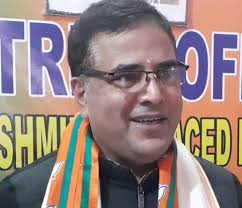Campaigning concludes for final phase of J&K polls: Stakes high for BJP
Jammu/Srinagar, Sep 29 (PTI) The intense campaigning for the third and final phase of polling in the Jammu and Kashmir Assembly election concluded on Sunday evening, with major political parties, particularly the BJP, Congress, NC and PDP, engaging in fierce exchanges over critical issues, including Pakistan, Article 370, terrorism and reservation.
Voting for this crucial phase, covering 40 Assembly segments across seven districts — Jammu, Udhampur, Samba and Kathua in the Jammu region and Baramulla, Bandipora and Kupwara in north Kashmir — is scheduled for October 1.
The electoral fate of 415 candidates, including former deputy chief ministers Tara Chand (Congress) and Muzaffar Beig, are at stake in this phase.
The voter turnout was robust in the earlier phases, with 61.38 per cent participation recorded in the first phase on September 18 and 57.31 per cent in the second phase on September 26.
This is the first Assembly election in Jammu and Kashmir since the abrogation of Article 370 of the Constitution in August 2019, with the results set to be announced on October 8.
Prime Minister Narendra Modi spearheaded the Bharatiya Janata Party’s (BJP) campaign, emphasising the party’s initiatives over the last 10 years to address what he described as “decades of injustice and historic discrimination”.
His remarks at a rally at the M A M Stadium were aimed at galvanising support for the BJP in the party’s traditional stronghold, asserting that the Union Territory status for Jammu and Kashmir is merely “temporary” and promising restoration of statehood.
The BJP achieved its best poll performance in Jammu and Kashmir in the 2014 Assembly election, winning 18 seats from the four Jammu districts and securing a total of 25 seats. Historically, the saffron party has never won any Assembly seat in the Kashmir valley.
Senior BJP leaders, including Home Minister Amit Shah, Defence Minister Rajnath Singh and party president J P Nadda, have actively campaigned, accusing the Congress, National Conference (NC) and People’s Democratic Party (PDP) of pursuing a “Pakistani agenda” and fostering terrorism — a claim vehemently denied by these parties.
Congress leaders, including party president Mallikarjun Kharge, Rahul Gandhi and Priyanka Gandhi Vadra, have also campaigned vigorously, promising to restore statehood in Jammu and Kashmir and provide a “people-friendly” government in a coalition with the NC.
Following a disappointing performance in the 2014 election — when the Congress failed to win any seat from the Jammu districts — there is hope for a stronger show by the party this time, buoyed by anti-incumbency sentiments against the BJP.
However, the Congress faced a setback when Kharge experienced dizziness while addressing a rally in Kathua on Sunday, though his condition was stable following medical care. The Congress president had to cancel his last rally at Udhampur.
The NC and the PDP, led by former chief ministers Farooq Abdullah, Omar Abdullah and Mehbooba Mufti, have also intensified their outreach efforts, criticising the BJP for an uptick in terror incidents in Jammu over the last three years.
Omar Abdullah challenged the BJP’s narrative, suggesting that by blaming the opposition, they absolve Pakistan of accountability.
In the 2014 Assembly polls, the PDP won seven of the 15 seats in north Kashmir, while the NC and Congress secured three and two seats respectively.
According to election officials, all necessary arrangements, including security measures, are in place, ensuring a secure environment for the voters.
The campaigning period, characterised by a political frenzy involving numerous candidates, including independents, concluded peacefully at 6 pm, marking the start of the mandatory 48-hour silent period before polling.
In the final phase, Jammu district has the highest number of candidates at 109, followed by Baramulla (101), Kupwara (59), Bandipora (42), Udhampur (37), Kathua (35) and Samba (32).
While the NC and the Congress are contesting the election in an alliance, their top leaders have largely campaigned separately for this phase. Rahul Gandhi addressed rallies in Jammu city and Sopore, a region previously known for separatism and insurgency.
Emerging regional players, such as People’s Conference chairman Sajad Gani Lone and Awami Ittehad Party chief Sheikh Abdul Rashid, also known as Engineer Rashid, have also been active in the campaign. Rashid’s party has fielded his brother Khursheed Ahmad from Langate while Lone’s party is contesting two seats.
As the political landscape evolves, the entry of Jamaat-e-Islami-backed candidates in some north Kashmir constituencies adds another layer of complexity to this competitive electoral battle.






